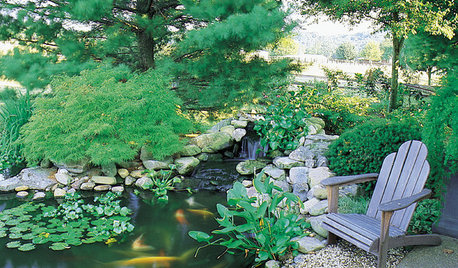Foul Weather Worms
19 years ago
Related Stories

GARDENING AND LANDSCAPINGWhat to Know Before You Buy Teak Outdoor Furniture
Learn about finishes, weathering, care and that age-old oil debate to get the teak furnishings that suit you best
Full Story
WINDOWSBahama Shutters Bring the Look of the Tropics Home
Even if hurricane season never hits your horizon, these louvered shutters provide ample tropical style
Full Story
DREAM SPACESWe Can Dream: Nurturing Escapes for Penning a Poem
16 picturesque hideaways built to inspire contemplation and a favorite slow art form
Full Story
GOLD FOLIAGEGreat Design Plant: Ginkgo Biloba
This ancient tree provides shade, tolerates urban planting conditions and explodes with golden yellow fall color
Full Story
GARDENING AND LANDSCAPINGHow to Make a Pond
You can make an outdoor fish paradise of your own, for less than you might think. But you'll need this expert design wisdom
Full Story
FEEL-GOOD HOME6 Design Ideas for Happy Pets
Keep your dog or cat feeling safe and in high spirits, and you'll all feel more at peace. Here's how
Full Story
REMODELING GUIDESClean-Burning Woodstoves Ignite a Greener Heating Trend
No need to rely on oil or gas to heat your home — new woodstove designs burn cleanly and are beautiful to boot
Full Story
GARDENING GUIDESCool-Season Vegetables: How to Grow Chard
A year-round garden favorite with a colorful stem, Swiss chard comes into its own in early spring and in fall
Full Story
REGIONAL GARDEN GUIDESSoutheast Gardener's September Checklist
Fertilize strawberries, plant a tree or two and beckon hummingbirds to your Southern garden this month
Full Story
GARDENING GUIDES11 Favorite Edibles for Your Cool-Season Garden
Plant crunchy carrots, crisp radishes, tender peas and other vegetables for fall and spring harvests
Full Story





Bdadawg
Kelly_Slocum
Related Professionals
Aurora Landscape Contractors · Beachwood Landscape Contractors · Dickinson Landscape Contractors · New Berlin Landscape Contractors · Painesville Landscape Contractors · Bellingham General Contractors · Chicago Ridge General Contractors · Clive General Contractors · Dardenne Prairie General Contractors · Duncanville General Contractors · Glenn Dale General Contractors · Lakewood General Contractors · Linton Hall General Contractors · Markham General Contractors · Valle Vista General Contractorscarnationman
PuffyJBoOriginal Author
Bdadawg
PuffyJBoOriginal Author
Kelly_Slocum